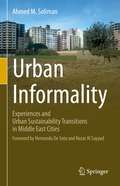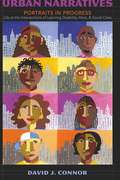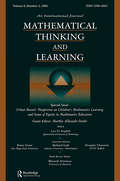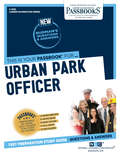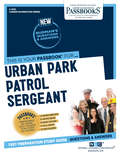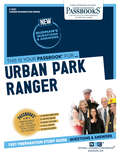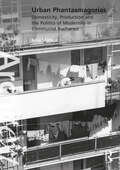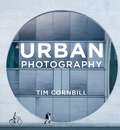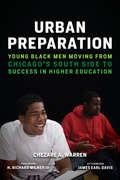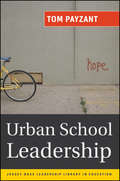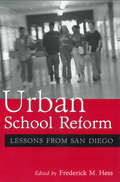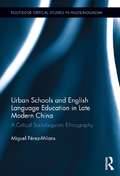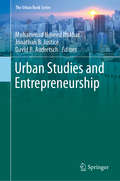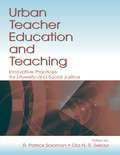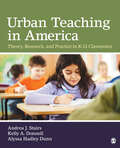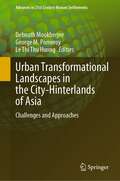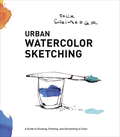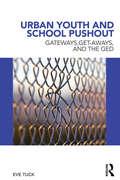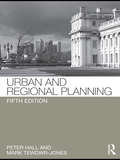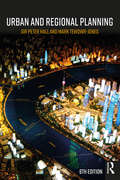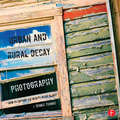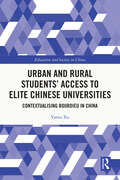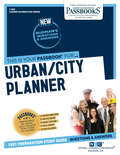- Table View
- List View
Urban Informality: Experiences and Urban Sustainability Transitions in Middle East Cities
by Ahmed M. SolimanThis professional book introduces an analytical framework of urban informality perspectives in the Middle East that is aligned with the Global South. The context of Egypt, Lebanon, and Jordan—in the Middle East— is the transregional focus of this book. In these contexts, the book opens a new arena of academic discussion on the theory and practice of urban informality.Urban Informality: Experiences and Urban Sustainability Transitions in Middle East Cities questions urban informality, "as a site of transitions", interrelated and interlinked with urban sustainability transitions in speedy changes in a given environment. The book presents ‘urban informality sustainability transitions’ regarding resilience and adaptability that require shifts in urban systems. Shifts from a static process to a dynamic process that eradicates the fragmentation between the tensions, anxieties, and pressures of four modes of production, reproduction, consumptions, and distribution of goods and services in the city and its practices. Finally, through eleven chapters, the concluding remarks explore to what extent and how can urban informality transitions be sustainable.
Urban Narratives: Portraits in Progress, Life at the Intersections of Learning Disability, Race, and Social Class
by David J. ConnorThis book focuses on the experiences of the author as a teacher in an urban public school special education programs, where students are labeled learning disabled (LD), Black or Latino(a), and working-class or poor.
Urban Parents Perspectives Children'S Math. Mtl V8#3
by Martha Allexsaht-SniderFirst published in 2006. Routledge is an imprint of Taylor & Francis, an informa company.
Urban Park Officer: Passbooks Study Guide (Career Examination Series)
by National Learning CorporationThe Urban Park Officer Passbook® prepares you for your test by allowing you to take practice exams in the subjects you need to study. It provides hundreds of questions and answers in the areas that will likely be covered on your upcoming exam, including but not limited to: memory for facts and information; using good judgment in the police field; reading, understanding and interpreting legal passages; applying written information (rules, regulations, policies, procedures, directives, etc.) in police situations; and other related areas.
Urban Park Patrol Sergeant: Passbooks Study Guide (Career Examination Series)
by National Learning CorporationThe Urban Park Patrol Sergeant Passbook® prepares you for your test by allowing you to take practice exams in the subjects you need to study. It provides hundreds of questions and answers in the areas that will likely be covered on your upcoming exam, including but not limited to: modern law enforcement methods and practices and the use of good judgment in solving police problems; patrol supervision; reading, understanding and interpreting written information; preparing written material; and other related areas.
Urban Park Ranger: Passbooks Study Guide (Career Examination Series #C-3267)
by National Learning CorporationThe Urban Park Ranger Passbook® prepares you for your test by allowing you to take practice exams in the subjects you need to study. It provides hundreds of questions and answers in the areas that will likely be covered on your upcoming exam, including but not limited to: comprehension and interpretation of written material concerning park rules, regulations, laws, environmental education, maps and other related material; forms completion, preparation of reports and other written communication; planning and organizing activities; and other related areas.
Urban Phantasmagorias: Domesticity, Production and the Politics of Modernity in Communist Bucharest (Architext)
by Iulia StăticăUrban Phantasmagorias examines the legacies of socialist housing in the city of Bucharest during the period of communist rule in Romania. The book explores the manner in which the socialist state reconfigured the city through concrete acts of demolition and construction, as well as indirectly through legal frameworks aimed at the regulation of women’s reproductive agency, in an attempt to materialize its idea of modernity. It follows the effects of this state agenda with a focus on the period between 1965 and 1989 through an investigation of the transformations, representations, meanings, and uses of domestic spaces. The book draws on Walter Benjamin’s concept of phantasmagoria, which provides a critical framework through which it articulates the dynamic relationship between ideology, architecture, and everyday practices, and reassesses their impact upon individual subjectivity and agency. The woman emerges as a central subject of the book, upon whom the phantasmagoric effects of the socialist state’s modernizing agenda have an acute impact at the level of lived domesticity and everyday life. Through a focus on the lived experiences of women, the book illuminates the prismatic effect of the state’s infrastructural and legal intentions, including the ways in which these were subverted through women’s lived bodily experiences of the home. The book establishes, both theoretically and through the concrete case of the city of Bucharest, the methodological significance of Benjamin’s notion of phantasmagoria as an epistemological approach to a modern communist cityscape. Urban Phantasmagorias is an important contribution to scholarship in architectural history and theory, urban and gender studies, and post-socialist and Eastern European studies.
Urban Photography
by Tim CornbillThe urban environment offers an exciting array of subjects to photograph, even in the smallest of towns. In the time it takes to walk a street or two, you can photograph panoramic skylines, people up close, at work or play, abstract architectural details, frenetic street activity, peaceful park scenes and so much more. You can capture elements of the past and present through the city's architecture in one carefully composed street scene, then, within minutes, frame up the most recognisable landmark in the city. This book gives you the practical skills and creative techniques you need to capitalize on the beautiful world right on your doorstep.
Urban Photography
by Tim CornbillThe urban environment offers a whole host of subjects to photograph, even in the smallest of towns. In the time it takes to walk a street or two, you can photograph panoramic skylines, people up close, at work or play, abstract architectural details, frenetic street activity and peaceful park scenes. You can capture elements of the past and present through the city's architecture in one carefully composed street scene, then, within minutes, frame up the most recognisable landmark in the city.
Urban Preparation: Young Black Men Moving from Chicago's South Side to Success in Higher Education (Race and Education)
by Chezare A. Warren2018 Critics' Choice Book Award, American Educational Studies Association (AESA) 2018 Outstanding Book Award, Society of Professors of Education Chezare A. Warren chronicles the transition of a cohort of young Black males from Urban Prep Charter Academy for Young Men to their early experiences in higher education. A rich and closely observed account of a mission-driven school and its students, Urban Preparation makes a significant contribution to our understanding of how young males of color can best be served in schools throughout the United States today. A founding teacher at Urban Prep, Warren offers a detailed exploration of what this single-sex public high school on the South Side of Chicago has managed to accomplish amid profoundly challenging circumstances. He provides a comprehensive portrait of the school—its leaders, teachers, and professional staff; its students; and the community that the school aims to serve—and highlights how preparation for higher education is central to its mission. Warren focuses on three main goals: to describe Urban Prep&’s plans and efforts to prepare young Black males for college; to understand how race, community, poverty, and the school contributed, in complex and interrelated ways, to the academic goals of these students; and to offer a wide-ranging set of conclusions about the school environments and conditions that might help young Black males throughout the country succeed in high school and college.
Urban School Leadership
by Tom PayzantThis important book, written by educational expert and urban school leader, Tom Payzant, offers a realistic understanding of what urban school leadership looks like from the inside. Payzant shares his first-hand knowledge of the unique managerial, instructional, and political tasks of this role. Effectively combining practical lessons and research, Urban School Leadership includes in-depth analysis of various leadership concerns. The book covers topics such as improving student achievement, working with unions, building community, and maintaining and developing resources. Most importantly, it offers stories of real school leaders whose successes and missteps reveal the inherent "messiness" of this difficult job. Urban School Leadership is part of the Jossey-Bass Leadership Library in Education series. "This important book provides compelling examples of how effective leaders can have hope, see progress, and achieve success for all children in the schools and districts they lead. "-Richard Riley, former United States Secretary of Education "Tom Payzant is one of the few people who could provide such a comprehensive, useful book for educational leaders at all levels. This very practical book is grounded in the important experiences and impressive judgment of one of our nation's most successful school superintendents"-Jon Schnur, co-founder and CEO, New Leaders for New Schools "Tom Payzant is one of the finest urban educators of our generation. Urban School Leadership is compelling, crisp, and wise-providing a clear path for those dedicated to improving the trajectory of children's lives. "-Timothy F. C. Knowles, executive director, Center for Urban School Improvement, University of Chicago "Urban School Leadership is a must read for anyone interested in the landscape of urban public education in America. "-Beverly Hall, superintendent, Atlanta Public Schools
Urban School Reform: Lessons from San Diego
by Frederick M. HessAn indispensable book for administrators, policymakers, scholars, and practitioners, Urban School Reform presents a revealing portrait of reform efforts while identifying the full range of issues that education reformers will need to address in districts across the country in the years ahead. Today's urban school reformers face a bewildering array of challenges. Urgent problems pertaining to governance, management, labor relations, classroom instruction, and numerous other areas face those who wish to reform and improve urban schools. Having undergone one of the nation's most comprehensive school reform efforts in recent years, San Diego has been a site of nationwide interest--one that is uncommonly well suited to learning about the challenges facing all reformers. This timely book addresses the full range of critical issues pertaining to urban school reform by looking closely at the recent reform efforts in San Diego. In essays by an impressive gathering of scholars and practitioners from across the country, the book considers crucial dimensions of reform efforts in the San Diego schools, including performance, governance, the external environment, central leadership and management, district infrastructure, support services, and school-level instructional efforts. The result is a full-scale assessment of San Diego's reform efforts--a record of unmistakable relevance and value to other urban reform movements throughout the United States.
Urban School Reform: Lessons from San Diego
by Frederick M. HessAn indispensable book for administrators, policymakers, scholars, and practitioners, Urban School Reform presents a revealing portrait of reform efforts while identifying the full range of issues that education reformers will need to address in districts across the country in the years ahead. Today's urban school reformers face a bewildering array of challenges. Urgent problems pertaining to governance, management, labor relations, classroom instruction, and numerous other areas face those who wish to reform and improve urban schools. Having undergone one of the nation's most comprehensive school reform efforts in recent years, San Diego has been a site of nationwide interest--one that is uncommonly well suited to learning about the challenges facing all reformers. This timely book addresses the full range of critical issues pertaining to urban school reform by looking closely at the recent reform efforts in San Diego. In essays by an impressive gathering of scholars and practitioners from across the country, the book considers crucial dimensions of reform efforts in the San Diego schools, including performance, governance, the external environment, central leadership and management, district infrastructure, support services, and school-level instructional efforts. The result is a full-scale assessment of San Diego's reform efforts--a record of unmistakable relevance and value to other urban reform movements throughout the United States.
Urban Schools and English Language Education in Late Modern China: A Critical Sociolinguistic Ethnography (Routledge Critical Studies in Multilingualism)
by Miguel Perez-MilansShortlisted for the 2014 BAAL Book Prize This book explores the meaning of modernization in contemporary Chinese education. It examines the implications of the implementation of reforms in English language education for experimental-urban schools in the People’s Republic of China. Pérez-Milans sheds light on how national, linguistic, and cultural ideologies linked to modernization are being institutionally (re)produced, legitimated, and inter-personally negotiated through everyday practice in the current context of Chinese educational reforms. He places special emphasis on those reforms regarding English language education, with respect to the economic processes of globalization that are shaping (and being shaped by) the contemporary Chinese nation-state. In particular, the book analyzes the processes of institutional categorization of the "good experimental school", the "good student", and the "appropriate knowledge" that emerge from the daily discursive organization of those schools, with special attention to the related contradictions, uncertainties and dilemmas. Thus, it provides an account of the on-going cultural processes of change faced by contemporary Chinese educational institutions under conditions of late modernity. Winner of The University of Hong Kong's Faculty Early Career Research Output Award for outstanding book publication, by the Faculty of Education
Urban Studies and Entrepreneurship (The Urban Book Series)
by David B. Audretsch Muhammad Naveed Iftikhar Jonathan B. JusticeThis book attempts to advance critical knowledge and practices for fostering a variety of entrepreneurship at a city level. The book aims to connect scholarship and policy practice in two disciplines: Urban Studies and Entrepreneurship. The book has included contributions from developed, emerging, and developing countries. The chapters are clubbed under five main sections; I. Startups and Entrepreneurial Opportunities, II. Knowledge Spillover, III. Social and Bureaucratic Entrepreneurialism, IV. Demography and Informal Entrepreneurs V. Perspectives from Emerging and Developing Economies.In this regard, the book explores a number of questions, such as: what are the important varieties of entrepreneurship, how can they be observed and measured, and how does each variety emerge and operate under various conditions of infrastructure and opportunity? Which type(s) of entrepreneurship should a city prefer? What can cities do to stimulate desirable forms of entrepreneurship or is it more of a spontaneous phenomenon? Why do policies that enhance entrepreneurship in some contexts seem instead to promote crony capitalism and rent-seeking in other contexts? Should cities focus on growing their own entrepreneurs and entrepreneurial enterprises or on luring them from other cities and countries? How can a collective action in a city promote (or hinder) entrepreneurship? The contributions in the present volume address head-on these questions at the intersection of urban studies, economic theory, and the practicalities of economic development and urban governance, in a genuinely global range of places and applications.
Urban Teacher Education and Teaching: Innovative Practices for Diversity and Social Justice
by R. Patrick SolomonThis volume illuminates the most pressing challenges faced by urban schools, teachers, teacher candidates, and teacher training programs and offers a range of insights and possibilities for urban teacher education and teaching. Covering issues spanning the broadly theoretical to the urgently practical, it goes beyond the traditional discourses in teacher education to focus on diversity, social justice, democratic schooling, and community building. What emerges is an emphatic message of hope for those committed to the ongoing project of improving urban teacher education and working in urban settings. Contributors from Canada, the United States, and the Caribbean bring rich and divergent knowledges, perspectives, and cultural experiences to their discussion of the three central themes around which the book is organized:• the conceptual framing of key issues in urban schooling;• pre-service teacher preparation for urban transformation; and • culturally relevant pedagogy and advocacy in urban settings. This book is intended for all students, practitioners, and researchers involved in urban education. It is appropriate as a text for student teaching and field experience seminars, and for courses dealing with social issues, educational policy, curriculum development, and multicultural teacher education.
Urban Teaching in America: Theory, Research, and Practice in K-12 Classrooms
by Andrea J. Stairs Kelly A. Donnell Alyssa H. DunnUrban Teaching in America: Theory, Research, and Practice in K-12 Classrooms is a brief yet comprehensive overview of urban teaching. Undergraduate and graduate students who are new to the urban context will develop a deeper understanding of the urban teaching environment and the challenges and opportunities they can expect to face while teaching in it. The authors have combined the work of urban education theorists, researchers, and practitioners to demonstrate that urban students bring many resources to their learning environment and can often serve as educators to the teachers themselves. Readers will feel prepared to challenge, rather than maintain, the status quo after reading this book.
Urban Transformational Landscapes in the City-Hinterlands of Asia: Challenges and Approaches (Advances in 21st Century Human Settlements)
by George M. Pomeroy Debnath Mookherjee Le Thi Thu HuongIn the context of mounting challenges stemming from a rapid transformation of the urban-regional landscapes in many Asian countries, this book highlights a multifaceted array of issues that increasingly engage the academic and planning communities in search of viable solutions to complex problems facing us. Even though cities continue to dominate development studies, urbanization of Asia is evolving toward a hybrid urban-rural nexus beyond the cities. This volume considers these shifting dynamics of Asian urbanization, including urban spatial transformations and their ramifications in the context of sustainability and planning. Through the lens of a set of empirical studies across diverse disciplines, geographies and methodologies. yet with an overarching concern for sustainability in varied (but interconnected) areas such as climate change, land use planning, infrastructure and urban mobility, and quality of life, these studies examine a range of important topics (e.g., flooding, transportation, housing, open space/ green space, urban garden and such) in city/regional settings. Together, they add insights into varied transformational processes or patterns at work on the urban-regional landscapes in a number of Asian countries while offering innovative approaches or alternatives. The proposed volume fills a gap in urban/regional studies in context of South and Southeast Asia that will be of interest to all stakeholders (e.g., planners, administrators, academicians and the citizenry), particularly those interested in sustainability and planning paradigms. It should be a timely and valuable addition to the Asian urbanization literature.
Urban Watercolor Sketching
by Felix ScheinbergerA guide that shows painters, drawers, doodlers, and urban sketchers how to bring their drawings to life with colorful, bold, yet accessible painting methods.Watercolor sketching is a rapidly emerging technique that enlivens sketches done in pen or pencil with the expressive washes, glazes, and luminous hues of watercolor . This lushly illustrated resource teaches artists on the go how to sketch with watercolor, rendering subjects efficiently and without inhibitions. Readers are guided through all aspects of the medium, from fundamental techniques including wet-on-wet, glazing, and washes; materials and supplies; and little known tips and tricks for getting the most out of watercolor (for example, just sprinkling a little salt on your painting creates a texture that's impossible to achieve with a brush.) A strong focus color theory provides a solid foundation for enhancing drawings with vibrant hues.
Urban Youth and School Pushout: Gateways, Get-aways, and the GED (Critical Youth Studies)
by Eve TuckWinner of the 2013 American Educational Studies Association's Critics Choice Award! Recent efforts to reform urban high schools have been marked by the pursuit of ever-increasing accountability policies, most notably through the use of high-stakes standardized testing, mayoral control, and secondary school exit exams. Urban Youth and School Pushout excavates the unintended consequences of such policies on secondary school completion by focusing specifically on the use and over-use of the GED credential. Building on a tradition of critical theory and political economy of education, author Eve Tuck offers a provocative analysis of how accountability tacitly and explicitly pushes out under-performing students from the system. By drawing on participatory action research, as well as the work of indigenous scholars and theories, this theoretically and empirically rich book illustrates urban public schooling as a dialectic of humiliating ironies and dangerous dignities. Focusing on the experiences of youth who have been pushed out of their schools under the auspices of obtaining a GED, Tuck reveals new insights on how urban youth view accountability schooling, value the GED, and yearn for multiple, meaningful routes to graduation.
Urban and Regional Planning
by Peter Hall Mark Tewdwr-JonesThis is the fifth edition of the classic text for students of urban and regional planning. It gives an historical overview of the developments and changes in the theory and practice of planning, throughout the entire twentieth century. This extensively revised edition follows the successful format of previous editions: it introduces the establishment of planning as part of the public health reforms of the late nineteenth century and goes on to look at the insights of the great figures who influenced the early planning movement, leading up to the creation of the post-war planning machine national and regional planning, and planning for cities and city regions, in the UK, from 1945 to 2010, is then considered. Specific reference is made to the most important British developments in recent times, including the Single Regeneration Budget, English Partnerships, the devolution of Scotland, Wales and Northern Ireland, the establishment of the Mayor of London and the dominant urban sustainability paradigm planning in Western Europe, since 1945, now incorporating new material on EU-wide issues, as well as updated country specific sections planning in the United States, since 1945, now discussing the continuing trends of urban dispersal and social polarisation, as well as initiatives in land use planning and transportation policies finally the book looks at the nature of the planning process at the start of the twenty-first century, reflecting briefly on shifts in planning paradigms since the 1960s and going on to discuss the main issues of the 1990s and 2000s, including sustainability and social exclusion and looking forward to the twenty-first century.
Urban and Regional Planning
by Peter Hall Mark Tewdwr-JonesThis is the sixth edition of the classic text for students of urban and regional planning. It gives a historical overview of the developments and changes in the theory and practice of planning throughout the entire 20th and first part of the 21st centuries. The extensively revised edition incorporates the most important developments in recent times: debates on economic rebalancing and national infrastructure including high speed rail, energy, millennium projects, Celtic devolution, European influence, impact of London on nation. A new chapter "Planning for cities and city regions 1990-2017": includes new material on housing, localism, neighbourhood planning, privatisation, city modernism, reform, Devo and city deals and metro mayors. Urban and Regional Planning will be invaluable to undergraduate as well as postgraduate Planning students. It will prove useful in a variety of built environment areas such as Architecture, Landscape Architecture, Urban Design, Real Estate where planning is taught.
Urban and Rural Decay Photography: How to Capture the Beauty in the Blight
by J. Dennis ThomasIf you are a photographer who sees the beauty in abandoned buildings, crumbling facades, and preserving a fading history, and who also has a love of urban exploration, you have stumbled on a must-have for your photographic library. Urban and Rural Decay Photography offers expert tips and techniques for capturing breathtaking photographs of your favorite decay scenes, whether in urban or rural settings. Author J. Dennis Thomas guides you through the history of decay photography, shows you what equipment you will need, and discusses digital, film and HDR capture and composition. The book addresses which artistic considerations work best for the kinds of shots that capture a moment and convey a story. He also provides you with important safety advice and matters of the law when entering and working with decaying structures. Chock full of inspiring images that will ignite your creativity and your passion for decay photography, Urban and Rural Decay Photography is just the book you need to get you out and discovering your newest urban or rural exploration adventure.
Urban and Rural Students’ Access to Elite Chinese Universities: Contextualising Bourdieu in China (Education and Society in China)
by Yanru XuStudies have shown the disparities between urban and rural students accessing elite universities in China, a phenomenon which Xu explores in this groundbreaking book. She argues that such disparities follow a Bourdieusian capital approach showing how urban parents increased capital benefits the advancement of their children’s education. This book qualitatively explores urban and rural students’ life stories prior to their elite university entry through interviews with both parents and students. It seeks a ‘reflective reappropriation’ of Bourdieu’s notions in understanding Chinese urban and rural students’ academic success. In addition to the implications for Chinese domestic and international scholars’ understanding of the mediating role of rurality, higher education access and Chinese policymakers’ ongoing initiatives on the hukou reform, this book promotes the global reflections on the development and promotion of national analytical concepts in understanding contextualised educational issues to advance knowledge co-production. An engaging text that will be of interest to students and researchers across the fields of global higher education and sociology of education in East Asia, as well as policymakers working towards increased participation, equity, and social justice in higher education worldwide.
Urban/City Planner: Passbooks Study Guide (Career Examination Series)
by National Learning CorporationThe Urban/City Planner Passbook® prepares you for your test by allowing you to take practice exams in the subjects you need to study. It provides hundreds of questions and answers in the areas that will likely be covered on your upcoming exam, including but not limited to: sociological, economic, design and environmental factors involved in phisical planning and community development; principles and practices of urban planning; understanding and interpreting maps, charts and graphs; understanding and interpreting written material; analyze and interpret materal and draw conclusions; ability to develop a work program; and other related areas.
